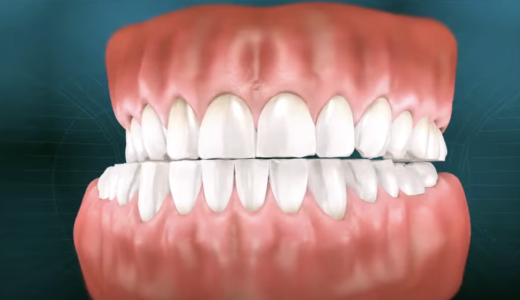Is nighttime teeth grinding secretly harming you? Here’s how to tell—and what to do about it
By
Veronica E.
- Replies 0
Disclaimer: The information provided in this article is for educational purposes only and is not intended as a substitute for professional medical advice, diagnosis, or treatment. Always consult your physician or other qualified healthcare providers with any questions you may have regarding a medical condition or before making any changes to your health regimen.
If you’ve ever woken up with a stiff jaw, a dull headache, or teeth that feel oddly sensitive, it may not just be “one of those mornings.”
You might be grinding your teeth at night—without even realizing it.
Known as bruxism, this common yet sneaky habit affects millions of Americans, including many older adults, and it can quietly take a toll on your dental health and quality of sleep.
But what causes this grinding in the first place?
And more importantly, what can you do to protect your teeth and your peace of mind?
Let’s take a closer look at what’s behind bruxism—and how to stop it.

What is bruxism, exactly?
Bruxism refers to the unconscious clenching or grinding of your teeth, usually during sleep.
It can involve repeated jaw movements that wear down your enamel and overwork your jaw muscles.
Many people don’t know they’re doing it until a dentist points out the signs—or until the pain sets in.
“Some of the first clues include worn-down teeth, unexplained sensitivity, or waking up with jaw tension,” says Dr. Shannon Kaiser, a general dentist at Mercy Medical Center in Baltimore.
Also read: Think your morning routine is healthy? One mistake could be ruining your teeth
Why does teeth grinding happen?
There’s no single cause for bruxism, but several common triggers can be involved—some surprising:
Also read: Are you destroying your teeth every day? Dentist reveals 5 common brushing mistakes that could be doing more harm than good
Signs you might be grinding your teeth
Most bruxism happens during sleep, but these symptoms can signal a problem:
How to manage bruxism and protect your teeth
The good news: bruxism is manageable.
These expert-recommended steps can help:
Also read: Ditch the sugar? See which unexpected foods could be harming your teeth
Can it go away on its own?
Sometimes, yes—especially if it’s triggered by short-term stress or a new medication.
But for many, bruxism is a longer-term issue that needs regular management.
As Dr. Seema Kurup explains, “Management can often become the cure.”
If you’ve noticed signs of bruxism—or just want to be sure—schedule a dental checkup.
Your dentist can identify wear patterns, evaluate your jaw function, and recommend the right steps to protect your smile.
Read next: Forget the gym! Discover the everyday activities that torch calories faster than exercise!

Have you experienced teeth grinding or jaw clenching? What helped you manage it? Drop a comment below to share your story or ask a question—your insight might help someone else sleep a little easier tonight.
If you’ve ever woken up with a stiff jaw, a dull headache, or teeth that feel oddly sensitive, it may not just be “one of those mornings.”
You might be grinding your teeth at night—without even realizing it.
Known as bruxism, this common yet sneaky habit affects millions of Americans, including many older adults, and it can quietly take a toll on your dental health and quality of sleep.
But what causes this grinding in the first place?
And more importantly, what can you do to protect your teeth and your peace of mind?
Let’s take a closer look at what’s behind bruxism—and how to stop it.

Teeth grinding, often unnoticed during sleep, can take a serious toll on dental health over time. Image Source: YouTube / Triangle Dental Reading.
What is bruxism, exactly?
Bruxism refers to the unconscious clenching or grinding of your teeth, usually during sleep.
It can involve repeated jaw movements that wear down your enamel and overwork your jaw muscles.
Many people don’t know they’re doing it until a dentist points out the signs—or until the pain sets in.
“Some of the first clues include worn-down teeth, unexplained sensitivity, or waking up with jaw tension,” says Dr. Shannon Kaiser, a general dentist at Mercy Medical Center in Baltimore.
Also read: Think your morning routine is healthy? One mistake could be ruining your teeth
Why does teeth grinding happen?
There’s no single cause for bruxism, but several common triggers can be involved—some surprising:
- Stress and anxiety: The most frequent culprits. Emotional stress often shows up in the body, and your jaw may clench as a result—even while you sleep.
- Lifestyle habits: Drinking coffee, alcohol, or using tobacco—especially in the evening—can increase muscle activity and disrupt sleep.
- Medications: Some antidepressants (like SSRIs or tricyclics) list bruxism as a possible side effect.
- Sleep disorders: Conditions such as sleep apnea and insomnia are often linked with nighttime teeth grinding.
- Health issues and age: Neurological conditions, thyroid disorders, or brain injuries can also play a role. Bruxism may be more common in younger adults but can develop later in life, especially with new stress or health changes.
Also read: Are you destroying your teeth every day? Dentist reveals 5 common brushing mistakes that could be doing more harm than good
Signs you might be grinding your teeth
Most bruxism happens during sleep, but these symptoms can signal a problem:
- Flattened or chipped teeth
- Increased sensitivity to hot or cold
- Soreness in your jaw or face in the morning
- Headaches, especially near your temples
- Clicking or popping in the jaw
- Interrupted sleep or snoring (from a partner or yourself)
How to manage bruxism and protect your teeth
The good news: bruxism is manageable.
These expert-recommended steps can help:
- Custom night guard: A dentist can make a mouthguard that protects your teeth while you sleep—think of it as a cushion for your jaw.
- Stress management: Calming nighttime routines, meditation, gentle stretches, or therapy can reduce tension.
- Cut back on stimulants: Reducing caffeine, alcohol, and smoking—especially before bed—can help your jaw relax.
- Jaw exercises: Simple techniques like resting your tongue on the roof of your mouth and doing slow breathing can ease tension.
- Muscle relaxants or Botox: In more severe cases, your doctor may recommend a short-term muscle relaxant or Botox to reduce jaw clenching.
- Treat sleep disorders: Addressing issues like sleep apnea may reduce or eliminate grinding altogether.
Also read: Ditch the sugar? See which unexpected foods could be harming your teeth
Can it go away on its own?
Sometimes, yes—especially if it’s triggered by short-term stress or a new medication.
But for many, bruxism is a longer-term issue that needs regular management.
As Dr. Seema Kurup explains, “Management can often become the cure.”
If you’ve noticed signs of bruxism—or just want to be sure—schedule a dental checkup.
Your dentist can identify wear patterns, evaluate your jaw function, and recommend the right steps to protect your smile.
Read next: Forget the gym! Discover the everyday activities that torch calories faster than exercise!
Key Takeaways
- Bruxism—nighttime teeth grinding—is often caused by stress, certain medications, sleep disorders, or lifestyle factors like caffeine or alcohol.
- Warning signs include jaw pain, worn-down or sensitive teeth, headaches, and interrupted sleep.
- Treatments include custom mouthguards, reducing stimulants, managing stress, doing jaw exercises, or addressing underlying health issues.
- If you suspect you’re grinding your teeth, consult your dentist for proper diagnosis and care—early action can prevent long-term damage.
Have you experienced teeth grinding or jaw clenching? What helped you manage it? Drop a comment below to share your story or ask a question—your insight might help someone else sleep a little easier tonight.






